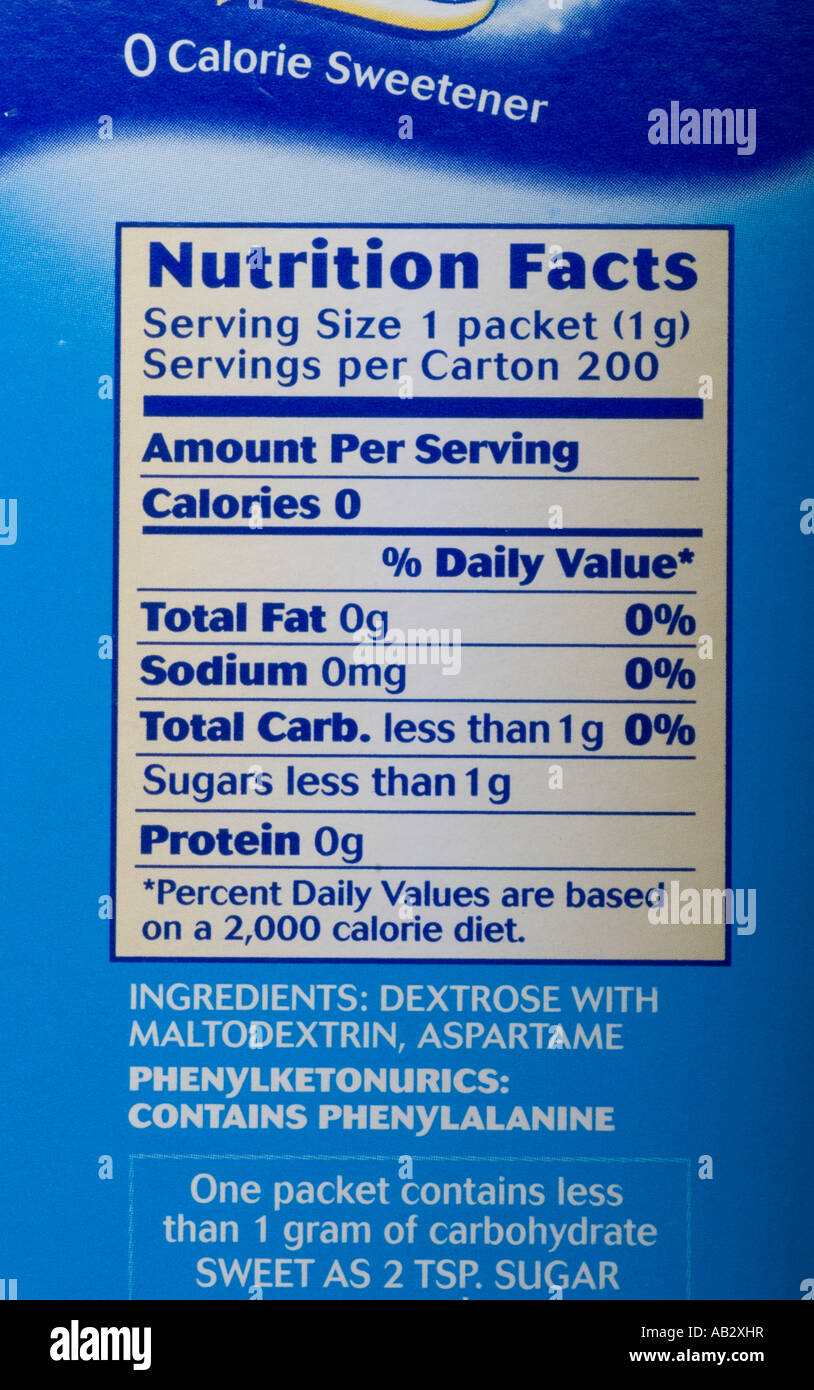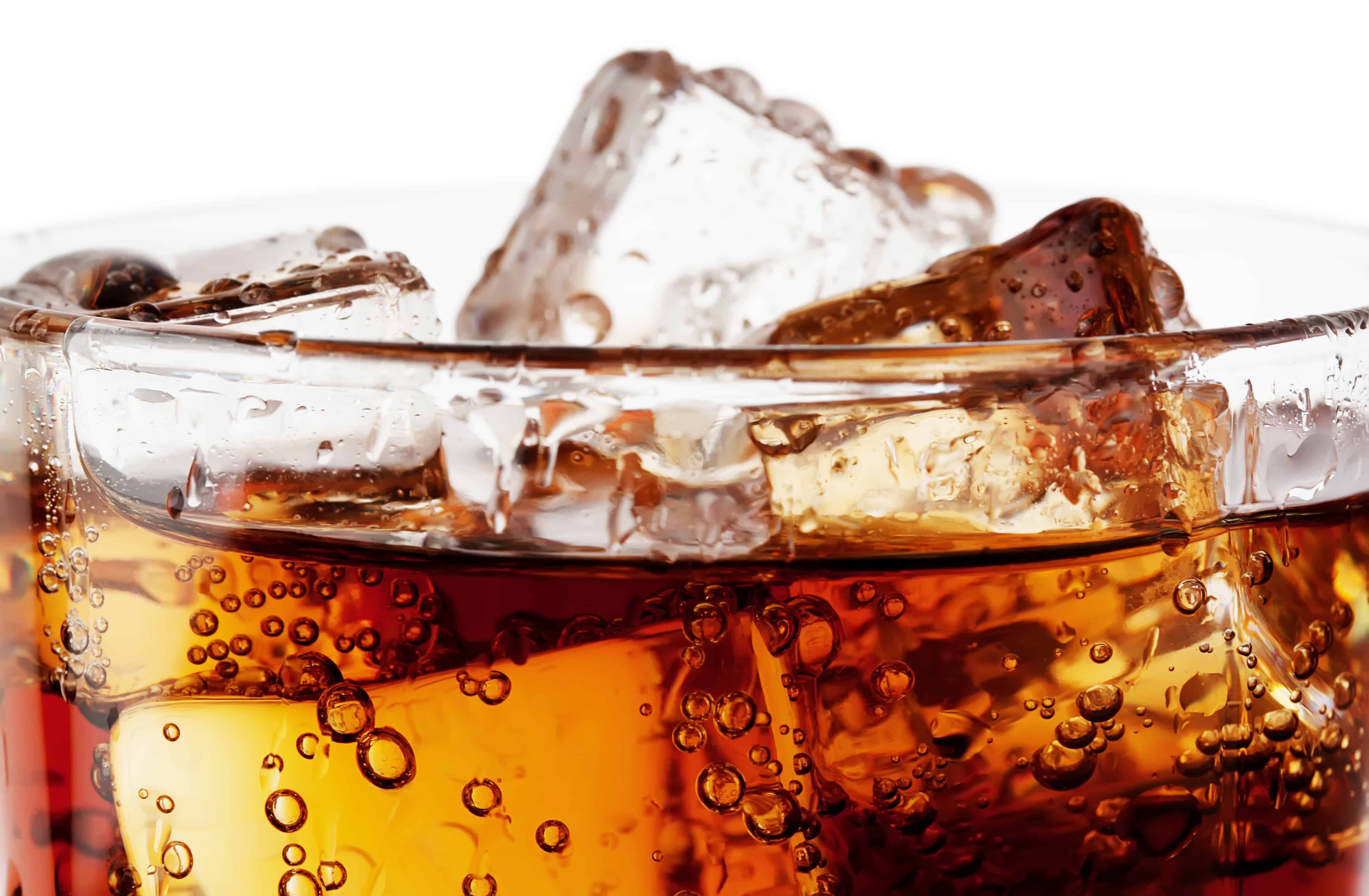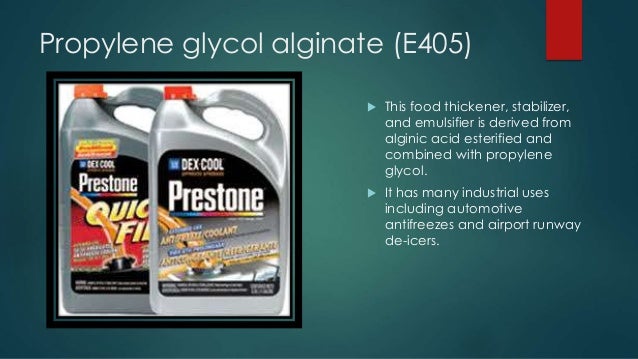39 aspartame on food labels
A List of Foods Containing Aspartame | livestrong Aspartame is an artificial sweetener accidentally discovered by a scientist researching an anti-ulcer medication in 1965, according to the International Food Information Council Foundation. It's composed of two amino acids: aspartic acid and phenylalanine. What Foods Contain Aspartame? | MD-Health.com Any food that has aspartame added will have it listed on the label for convenience. Aspartame is typically used in sugar-free or low-calorie foods or drinks. There has been a significant growth in the use of this ingredient in the past two decades as the demand for sugar-free options has increased.
Why Does Aspartame Have a Warning Label? | Pediatric Case ... Aspartame (L-aspartyl-L-Phemethyl ester) is an artificial sweetener that metabolizes to Phe, L-aspartic acid and methanol. It was first discovered in 1965, and approved by the US Federal Drug Administration in 1981.
Aspartame on food labels
FDA In Brief: FDA Looking at Nutrition Facts Labeling of ... Our goal is to provide information on food labels that is meaningful to consumers, providing them the information that they need to make informed decisions about their food choices and health - and... Food standards agencies rule out aspartame bans as ... The list of food additives authorised for use in the UK will not change at the end of the Brexit transition period, according to the country's food safety regulator, while the EFSA insists that aspartame does not pose a safety concern at current levels of exposure. Aspartame is not marketed as AminoSweet on food labels ... While a company that produces aspartame did rename its product for marketing purposes in 2010, this was a move by only one company manufacturing aspartame. On food labels, aspartame still cannot be...
Aspartame on food labels. Everything You Need to Know About Aspartame - Food Insight Aspartame is a low-calorie sweetener that has been used for decades as a way to lower one's intake of added sugars while still providing satisfaction from enjoying something sweet. Aspartame is about 200 times sweeter than sugar, and as such only a small amount of the sweetener is needed to match the sweetness provided by sugar. Why is There a Warning About Phenylketonurics on Diet Soda ... Tyrosine is needed to make melanin, which is the dark brown pigment in the body (skin, eyes). PKU babies will tend to have blond hair, blue eyes, and fair skin. Phenylketonurics warning on bottle of Diet Coke. This warning will be found on any food or beverage. product which contains aspartame. Labelling requirements for sweeteners and foods that ... The following table outlines what must be declared on the labels of prepackaged products that contain aspartame, sucralose, acesulfame-potassium and/or neotame when present in a food or sold as a table-top sweetener [B.01.014, B.01.015, B.01.016, B.01.017, B.01.019, B.01.020, B.01.022, B.01.023, FDR]. Polydextrose labelling requirements › diet › what-to-know-about-sucraloseSucralose: Facts and Safety of Splenda - WebMD The difference between Splenda and other sweeteners, like aspartame (Equal) and saccharin (Sweet’N Low), is that it’s actually made from real sugar. This gives it a taste that is generally ...
List of Aspartame Products - Drugsdb.com Read the food label of each product you take. Manufacturers are required to list all ingredients contained in every food product. Since tabletop sweeteners and condiments contain aspartame, majority of cooked foods you consume, regardless of whether you bought them from a fast-food or cooked them in your own kitchen, may contain aspartame. CFR - Code of Federal Regulations Title 21 - Food and Drug ... Sec. 172.804 Aspartame. The food additive aspartame may be safely used in food in accordance with good manufacturing practice as a sweetening agent and a flavor enhancer in foods for which... Food additives - Food Standards Agency This labelling helps consumers to identify foods with high caffeine content in those products where they may not expect to find it. Drinks Drinks that contain caffeine from whatever source at a... 'No Added Sugar' on labels means The product can contain ... The food industry was given until 2021 to make the transition; however, new nutrition labels are already showing up on packages. The amount of total sugars, listed on the nutrition label in grams, lumps together free sugars and naturally occurring sugars (this hasn't changed), so you still can't tell the amount of sugar that's been added by the ...
What is Aspartame? - Food Insight Aspartame is made up of two amino acids, aspartic acid and phenylalanine. When aspartame is eaten, it's broken down into these amino acids and a small amount of methanol in your body. All these components are naturally found in several foods, including fruits, vegetables, meats and eggs. Sweet as Sugar? Aspartame - Food Standards Aspartame is an intense sweetener added to low-energy or sugar-free foods. It is used in foods including yoghurt, confectionery and carbonated beverages. The safety of aspartame has been comprehensively reviewed by FSANZ and other international organisations, including: Food and Agricultural Organization/World Health Organization Aspartame - Canada.ca Aspartame. Aspartame, a low-calorie artificial sweetener, has been permitted for use as a food additive in Canada since 1981 in a number of foods including soft drinks, desserts, breakfast cereals and chewing gum and is also available as a table-top sweetener. It is made by the bonding together of the amino acids aspartic acid and phenylalanine ... What Food Labels Really Mean - Raw, All Natural, GMO, BPA ... Food Labels Lingo #7: Sugar-Free "Sugar-Free" products often contain synthetic sweeteners like sucralose and aspartame. Studies show artificial sweeteners can actually lead to weight gain, and aspartame has been linked to birth defects, diabetes, epilepsy/seizures, emotional disorders, and brain cancer.
Aspartame Poisoning: Signs, Dangers and Treatments | MD ... Reading food labels and avoiding aspartame can literally be a life changing activity. Aspartame Detoxification Program. Detoxifying your body from the ill effects of aspartame is a powerful method to reverse any symptom related to using this artificial sweetener. Over 92 different signs and symptoms are attributed to aspartame.
Hidden Sources Of MSG And Aspartame In Foods Aspartame is a sweetener made from two amino acids, phenylalanine and the excitotoxin aspartate. It should be avoided at all costs. Aspartame complaints account for approximately 70 percent of ALL complaints to the FDA. It is implicated in everything from blindness to headaches to convulsions.
Food Labels: 5 Harmful Ingredients To Avoid | ThePostGame.com Aspartame is the most common artificial sweetener that is used in tons and tons of food products. This sweetener is made up of three chemicals: Aspartic acid, phenylalanine and methanol.
en.wikipedia.org › wiki › Food_energyFood energy - Wikipedia Many governments require food manufacturers to label the energy content of their products, to help consumers control their energy intake. To facilitate evaluation by consumers, food energy values (and other nutritional properties) in package labels or tables are often quoted for convenient amounts of the food, rather than per gram or kilogram; such as in "calories per serving" or "kcal per 100 ...
› guidance › food-labelling-giving-foodFood labelling: giving food information to consumers - GOV.UK Apr 27, 2015 · 6 May 2022. Updated the section 'Labelling pre-packed food'. Added a link to guidance about labelling spirit drinks. 29 November 2017. Update to link to WRAP date marking guidance.
Aspartame (Q&A): What is it and what foods contain this ... Aspartame is used to replace sugar for the production of 'energy-reduced' food or food with 'no added sugar'. It is also used in the production of food for particular nutritional uses. Examples of foods and beverages falling within these categories include sparkling soft drinks, desserts, sweets, chewing gum, yogurt, and table-top sweeteners.
Mandatory labelling of sweeteners - Labelling requirements ... The following table outlines what must be declared on the labels of prepackaged products that contain aspartame, sucralose, acesulfame-potassium and/or neotame when present in a food or sold as a table-top sweetener [B.01.014, B.01.015, B.01.016, B.01.017, B.01.019, B.01.020, B.01.022, B.01.023, FDR]. Polydextrose labelling requirements
My Family Survival Plan FOOD ADDITIVES - KNOW WHAT YOU’RE FEEDING YOUR CHILDREN BEFORE IT’S TOO ...
› food › food-additives-petitionsAdditional Information about High-Intensity Sweeteners - FDA Labels of aspartame-containing foods and beverages must include a statement that informs individuals with PKU that the product contains phenylalanine. Acesulfame potassium (Ace-K) Acesulfame...
What Food Products Is Aspartame In? Aspartame Products Aspartame has been a sweetener in many low-calorie, sugar-free foods and beverages since the 1980's. Because aspartame is 200 times sweeter than sugar, less can be used to give the same level of sweetness. Thus, the use of aspartame lowers the calories in foods or beverages. 200 times sweeter than sugar
What is other names for aspartame - Food Additives ... Aspartame has many names, Aspartame is one of the most common artificial sweeteners in use today. It is sold under the brand names NutraSweet and Ajinomoto, Aspartame is made by joining together the amino acids aspartic acid and phenylalanine. Amino acids are the building blocks of proteins and are found naturally in many foods.
Read Your Labels: Top Ten Additives to Avoid - #2 Aspartame Number two: Aspartame (a.k.a. NutraSweet, Equal) the 'diet devil' in disguise. The aspartame fiasco is an example of how one bad regulatory decision can set the stage for a host of subsequent evils. In this case, the 'original sin' was a Food and Drug Administration commissioner's decision more than three decades ago to ignore the ...
PKU, Allergies and Other Sensitivities - Aspartame Some of the reported side effects from aspartame that have been tested include headaches, nausea, dizziness, nasal congestion, eczema, asthma, mood changes and tingling, but research to date has not confirmed these associations even when aspartame was provided in amounts far greater than people typically consume.
Aspartame - Wikipedia Because aspartame contains a small amount of phenylalanine, foods containing aspartame sold in the United States must state: "Phenylketonurics: Contains Phenylalanine" on product labels. [6] In the UK, foods that contain aspartame are required by the Food Standards Agency to list the substance as an ingredient, with the warning, "Contains a ...
Aspartame is not marketed as AminoSweet on food labels ... While a company that produces aspartame did rename its product for marketing purposes in 2010, this was a move by only one company manufacturing aspartame. On food labels, aspartame still cannot be...
Food standards agencies rule out aspartame bans as ... The list of food additives authorised for use in the UK will not change at the end of the Brexit transition period, according to the country's food safety regulator, while the EFSA insists that aspartame does not pose a safety concern at current levels of exposure.
FDA In Brief: FDA Looking at Nutrition Facts Labeling of ... Our goal is to provide information on food labels that is meaningful to consumers, providing them the information that they need to make informed decisions about their food choices and health - and...










Post a Comment for "39 aspartame on food labels"